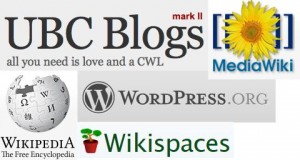In my experience with blogs, I’ve used it more as a marketing tool related to our library’s services to healthcare staff rather than posting reflections like the one we use for our course. Some of the aspects that have been of minor concern are related to Noelene’s scenario in which unnecessary commentaries may be received as part of posting information for public consumption (i.e. spam). In relation to this, I’ve found that it’s important to change the default settings of blogs (or any social media site like Facebook, etc) so that it’s at the appropriate level of privacy and format that your preferences are. It’s interesting how the Internet may have an unforgettable memory as the amount of digital information grows exponentially. Thus, the implications of this type of digital memory cannot be taken lightly. I think that all individuals need to understand how a service offered by a particular site works by consulting their terms of service and also consider how much information (especially that of a personal nature) they will be revealing to others. Online predators, hackers and the like are one aspect to contend with, but I’ve even heard of individuals having their homes ransacked based on an update they decided to post on their Facebook profile. Also, I appreciate the nature of information sharing, however when you start seeing things like ultrasound images as someone’s profile photos, it makes you wonder what’s going on. As humans it’s in our nature to want to communicate, but how much information is too much information to share with others?
Yet, there are positive aspects of using blogs and other social media sites. For example, there is the ability for one to connect more quickly and readily with others, writing improvements can occur, and people are able to use blogs as reflective tools (akin to personal journals and diaries). As Downes (2004) states “blogging is an opportunity to exchange our point of view with the rest of the world not just people in our immediate environment.” As such, I think that the advent of the Internet has levelled the playing field in a way that it is easier to connect with individuals from all walks of life and different professions all around the world. Also, the use of reflections for student learning really puts the responsibility of learning into the students’ own hands. They can determine the nature and the direction in which their learning needs take them in any given course. Additionally, with the use of social media online learning communities are far more expansive rather than limited to the traditional confines of classroom learning. Thus, the learning journey can continue on indefinitely depending on the level of participation by individuals.
I also find that tracking other people’s blogs helps inform me in my own practice and is a form of ongoing professional development. Although blogs are unlike journal articles, they can be more current and offer timely information (as journal articles go through a process to enter into the publication phase). Thus, with blogs, information can be quickly distributed online where ideas can flourish and be shared with others. It can also have a multiplying effect where one blogger’s ideas leads to inspire another person and those ideas may further develop. It does illustrate the power of sharing information, as a collective community each of us can learn from one another through the use of these online tools.
Reference
Downes, S. (2004). Educational blogging. Educause Review. Retrieved from http://net.educause.edu/ir/library/pdf/ERM0450.pdf
